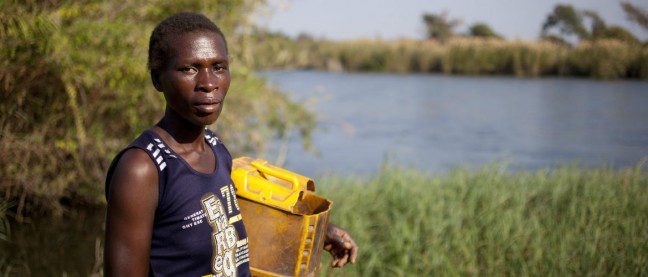Extreme inequality — the gap between the rich and the poor — is rising. Today, 62 people have the same wealth as 3.6 billion people — the poorest half of the world.
Barbara says she feels like “a lost person”.
Before she lost her husband to cancer, she had to sell livestock to pay for his treatment. Now she spends four hours walking every day to collect water for her crops, so she can feed her two children.
Barbara is from Zambia – one of the 10 fastest growing economies in the world. But like 64% of the country, Barbara lives in extreme poverty.
Extreme inequality is one of the defining issues of our time.
And it is getting worse. Today, just 62 individuals have the same wealth as the poorest half of the world.
It’s a huge injustice.
Perhaps even more astonishing, the richest 1% have accumulated more wealth than the rest of the planet combined — and it has happened one year earlier than predicted.
Oxfam’s newest report, An Economy for the 1%, finds that, far from trickling down, income and wealth is being sucked upwards at an alarming rate, out of the reach of ordinary people. Australia hasn’t escaped this trend. Here, the richest 10% of people own more wealth than all other Australians combined, and our richest individual has the same amount of wealth as the poorest 10% of Australians.
Not only that, if you look at the increase in wealth in Australia over the past 15 years, over half of the increase has been captured by the richest 1%, while the poorest 10% of Australians got such a small share of the overall increase that it rounds down to 0%.
The global inequality crisis is reaching new extremes and is bad for us all. Yet the consequences for the world’s poorest people are particularly severe. Rising economic inequality makes existing inequalities worse. Countries with higher income inequality tend to have larger gaps between women and men in terms of health, education, labour market participation, and representation in parliaments.
Tax Dodging
Tax is one essential tool to help end extreme inequality, and could help lift millions of people out of poverty. Tax revenues collected by governments here and around the world are key to providing public services like healthcare, education and transport infrastructure for everyone — we all rely on the public services funded by tax.
When taxation works fairly, the majority benefit. But taxation is not working as it should. As taxes go unpaid due to widespread avoidance by big business and the mega rich, government budgets feel the pinch, and this in turn leads to less funding for vital public services.
One way that multinational corporations and wealthy individuals avoid paying tax is through the use of tax havens — these are jurisdictions or territories that allow individuals and companies to avoid paying their fair share of tax through high levels of secrecy and/or disproportionately low tax rates.
Developing countries lose at least $100 billion in tax revenues each year, because of the vast amount of money that’s moved to offshore tax havens, out of the reach of ordinary citizens. Poorer countries in particular suffer the consequences – they are deprived of funds needed to tackle poverty, put children in school and prevent people dying from curable diseases.
Barbara never had the chance to go to school. If she had, she would have liked to be a nurse or a teacher. Her son doesn’t go to school either, because she can’t afford the registration fees. She knows that things could be different.
If everyone paid their fair share of tax, we could have a chance to meet the basic needs of people living in poverty, give them control over their own lives and the opportunity to change their futures.
Inequality is not inevitable. Our world is not short of wealth. It simply makes no sense, morally or economically, to have so much in the hands of so few. The fight against poverty will not be won until the inequality crisis is tackled.
What next?
- You can help make tax fair.
- Read Oxfam’s latest report: An Economy for the 1%

